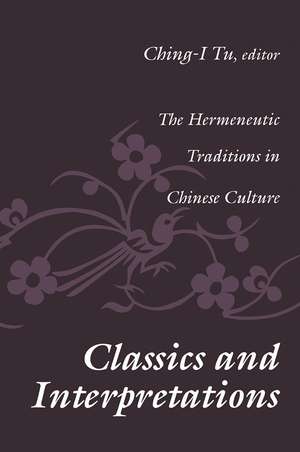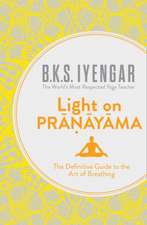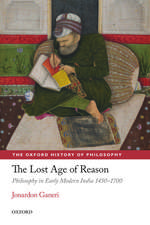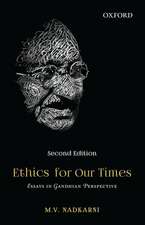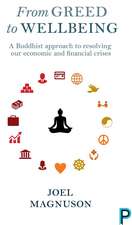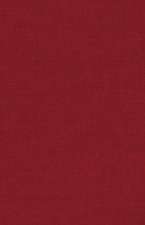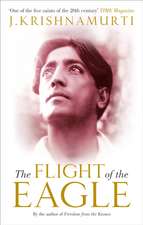Classics and Interpretations: The Hermeneutic Traditions in Chinese Culture
Editat de Ching-I Tuen Limba Engleză Paperback – 29 ian 2018
This volume makes a concerted effort to remedy our ignorance of the Chinese hermeneutical tradition. Part 1, "The Great Learning and Hermeneutics," demonstrates the use of commentary to define how the individual creates his social self, and discusses differing interpretations of the Ta-hsueh text and its treatment as either canonical or heterodox. Part 2, "Canonicity and Orthodoxy," considers the philosophical touchstones employed by Neo-Confucian canonical exegetes and polemicists, and discusses the Han canonization of the scriptural Five Classics, while illuminating a double standard that existed in the hermeneutical regime of late imperial China. Part 3, "Hermeneutics as Politics," discusses the transformation of both the classics and scholars, and explores the dominant hermeneutic tradition in Chinese historiography, the scriptural tradition and reinterpretation of the Ch'un-ch'iu, and reveals the pragmatism of Chinese hermeneutics through comparison of the Sung debates over the Mencius. The concluding sections include essays on "Chu Hsi and Interpretation of Chinese Classics," "Hermeneutic Traditions in Chinese Poetics and Non-Confucian Contexts," "Reinterpretation of Confucian Texts in the Ming-Ch'ing Period," and "Contemporary Interpretations of Confucian Culture."
Through these literate and brilliantly written essays the reader witnesses not merely the great breadth and depth of Chinese hermeneutics but also its continuity and evolutionary vigor. This volume will excite scholars of the Confucian, Buddhist, and Taoist systems of thought and belief as well as students of history and hermeneutics.
| Toate formatele și edițiile | Preț | Express |
|---|---|---|
| Paperback (1) | 407.85 lei 6-8 săpt. | |
| Taylor & Francis – 29 ian 2018 | 407.85 lei 6-8 săpt. | |
| Hardback (1) | 992.37 lei 6-8 săpt. | |
| Taylor & Francis – 30 apr 2000 | 992.37 lei 6-8 săpt. |
Preț: 407.85 lei
Nou
Puncte Express: 612
Preț estimativ în valută:
78.07€ • 81.86$ • 64.50£
78.07€ • 81.86$ • 64.50£
Carte tipărită la comandă
Livrare economică 30 ianuarie-13 februarie 25
Preluare comenzi: 021 569.72.76
Specificații
ISBN-13: 9781138508217
ISBN-10: 1138508217
Pagini: 482
Dimensiuni: 152 x 229 x 25 mm
Greutate: 0.45 kg
Ediția:1
Editura: Taylor & Francis
Colecția Routledge
Locul publicării:Oxford, United Kingdom
ISBN-10: 1138508217
Pagini: 482
Dimensiuni: 152 x 229 x 25 mm
Greutate: 0.45 kg
Ediția:1
Editura: Taylor & Francis
Colecția Routledge
Locul publicării:Oxford, United Kingdom
Cuprins
1: The Great Learning and Hermeneutics; 1: Expanding the Tao: Chu Hsi’s Commentary on the Ta-hsüeh; 2: The Daxue at Issue: An Exercise of Onto-Hermeneutics (On Interpretation of Interpretations); 3: Between Sanctioned Change and Fabrication: Confucian Canon ( Ta-hsüeh ) and Hermeneutical Systems Since the Sung Times; 2: Canonicity and Orthodoxy; 4: Touchstones of Neo-Confucian Orthodoxy; 5: Scripture and Authority: The Political Dimension of Han Wu-ti’s Canonization of the Five Classics; 6: Messenger of the Ancient Sages: Song-Ming Confucian Hermeneutics of the Canonical and the Heretical; 3: Hermeneutics as Politics; 7: The Confucian Classics: Kingship and Authority 1; 8: Objectivity, Truth, and Hermeneutics: Re-reading the Chunqiu; 9: The Way of the Unadorned King: The Politics of Tung Chung-shu’s Hermeneutics; 10: Chinese Hermeneutics as Politics: The Sung Debates over the Mencius; 4: Chu Hsi and the Interpretation of the Chinese Classics; 11: To Know the Sages Better Than They Knew Themselves: Chu Hsi’s “Romantic Hermeneutics”; 12: Historicity, Tradition, Praxis , and Tao: A Comparison of the World Views of Zhang Xuecheng and Modem Philosophical Hermeneutics; 13: Chu Hsi Reading the Classics: Reading to Taste the Tao—“This Is...A Pipe,” After All 1; 5: Hermeneutics in Chinese Poetics and Non-Confucian Contexts; 14: Chinese Lyric Subject in/and the Act of Interpretation: Toward Hermeneutics of Chih-yin; 15: Textual Hermeneutics and Beyond: With the Tao Te Ching and the Chuang Tzu as Examples; 16: Chung-yung in Northern Sung Intellectual Discourse: The Buddhist Components; 6: Reinterpretations of Confucian Texts in the Ming-Ch’ing Period; 17: Hermeneutics and Classicism: the New Script ( jinweti ) Learning of Gong Zizhen and Wei Yuan; 18: Mediating Word, Sentence, and Scope without Violence: Janies Legge’s Understanding of “Classical Confucian” Hermeneutics; 19: Philosophical Hermeneutics and Political Reform: A Study of Kang Youwei’s Use of Gongyang Confucianism; 7: Contemporary Interpretations of Confucian Culture; 20: Mou Tsung-san’s Interpretation of Confucianism: Some Hermeneutical Reflections; 21: A Radical Hermeneutics of Chinese Literary Tradition: On Zhou Zuoren’s Zhongguo xinwenxue deyuanliu
Descriere
In recent years in the "West," scholars have attempted to unravel old constructs of interpretation and understanding, using the discipline of hermeneutics, or the scientific study of textual interpretation. Borrowed from students of the ever growing body of biblical interpretive literature that originated in the early Christian era, theoretical hermeneutics has given many contemporary scholars potent tools of textual interpretation. Classics and Interpretations applies this method to Chinese culture. Several essays focus on hermeneutic traditions of Neo-Confucianism. Others move outside of these traditions to attempt an understanding of the role of hermeneutics in Taoist and Buddhist textual interpretation, in Chinese poetics and painting, and in contemporary Chinese culture.
This volume makes a concerted effort to remedy our ignorance of the Chinese hermeneutical tradition. Part 1, "The Great Learning and Hermeneutics," demonstrates the use of commentary to define how the individual creates his social self, and discusses differing interpretations of the Ta-hsueh text and its treatment as either canonical or heterodox. Part 2, "Canonicity and Orthodoxy," considers the philosophical touchstones employed by Neo-Confucian canonical exegetes and polemicists, and discusses the Han canonization of the scriptural Five Classics, while illuminating a double standard that existed in the hermeneutical regime of late imperial China. Part 3, "Hermeneutics as Politics," discusses the transformation of both the classics and scholars, and explores the dominant hermeneutic tradition in Chinese historiography, the scriptural tradition and reinterpretation of the Ch'un-ch'iu, and reveals the pragmatism of Chinese hermeneutics through comparison of the Sung debates over the Mencius. The concluding sections include essays on "Chu Hsi and Interpretation of Chinese Classics," "Hermeneutic Traditions in Chinese Poetics and Non-Confucian Contexts," "Reinterpretation of Confucian Texts in the Ming-Ch'ing Period," and "Contemporary Interpretations of Confucian Culture."
Through these literate and brilliantly written essays the reader witnesses not merely the great breadth and depth of Chinese hermeneutics but also its continuity and evolutionary vigor. This volume will excite scholars of the Confucian, Buddhist, and Taoist systems of thought and belief as well as students of history and hermeneutics.
This volume makes a concerted effort to remedy our ignorance of the Chinese hermeneutical tradition. Part 1, "The Great Learning and Hermeneutics," demonstrates the use of commentary to define how the individual creates his social self, and discusses differing interpretations of the Ta-hsueh text and its treatment as either canonical or heterodox. Part 2, "Canonicity and Orthodoxy," considers the philosophical touchstones employed by Neo-Confucian canonical exegetes and polemicists, and discusses the Han canonization of the scriptural Five Classics, while illuminating a double standard that existed in the hermeneutical regime of late imperial China. Part 3, "Hermeneutics as Politics," discusses the transformation of both the classics and scholars, and explores the dominant hermeneutic tradition in Chinese historiography, the scriptural tradition and reinterpretation of the Ch'un-ch'iu, and reveals the pragmatism of Chinese hermeneutics through comparison of the Sung debates over the Mencius. The concluding sections include essays on "Chu Hsi and Interpretation of Chinese Classics," "Hermeneutic Traditions in Chinese Poetics and Non-Confucian Contexts," "Reinterpretation of Confucian Texts in the Ming-Ch'ing Period," and "Contemporary Interpretations of Confucian Culture."
Through these literate and brilliantly written essays the reader witnesses not merely the great breadth and depth of Chinese hermeneutics but also its continuity and evolutionary vigor. This volume will excite scholars of the Confucian, Buddhist, and Taoist systems of thought and belief as well as students of history and hermeneutics.
